Ford Fusion: Supplemental Restraint System / Occupant Classification System (OCS) Sensor. Removal and Installation
Removal
NOTICE: To prevent system failure, carry out the OCS reset when a front passenger seat cushion is disassembled, a new trim cover is installed or an OCS service kit is installed. Use a scan tool to carry out the OCS reset command.
NOTICE: The cushion heater mat on a front outboard passenger seat is not serviced separately. If a new cushion heater mat is needed on the front passenger seat, install an OCS service kit equipped with a heater mat. Failure to follow this instruction may result in incorrect operation of the OCS.
NOTE: OCS components (seat cushion foam pad, bladder with OCSM) are calibrated to each other and are serviced as an assembly. The OCS components are not to be installed separately. If a new OCS, OCS component or seat cushion foam pad are needed, a new OCS service kit (seat cushion foam pad, bladder with OCSM) must be installed as an assembly.
NOTE: Removal steps in this procedure may contain installation details.
-
Remove the front seat cushion cover.
Refer to: Front Seat Cushion Cover (501-10A Front Seats, Removal and Installation).
-
NOTICE: Using excessive force when bending the bracket can damage the OCS sensor housing.
NOTE: Follow the unique instructions or graphic for this step in installation.
Disconnect the electrical connector, bend the bracket tab away and slide the OCS sensor off the bracket.
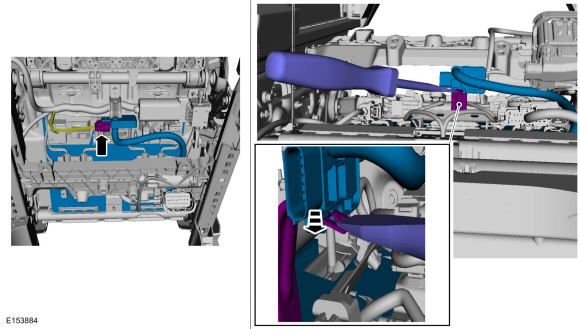 |
-
If equipped with heated seats.
Disconnect and position the heated seat wire harness aside.
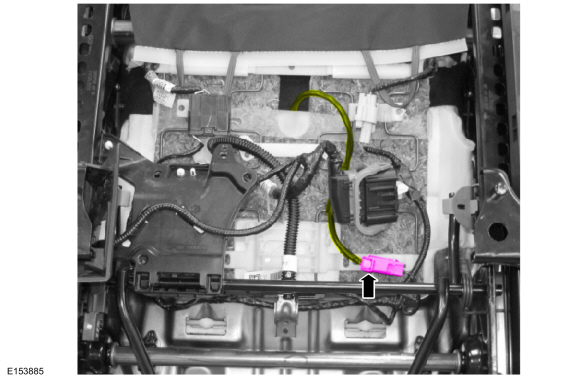 |
-
If equipped with original equipment (OE) OCS.
Remove the cushion foam and cover as an assembly.
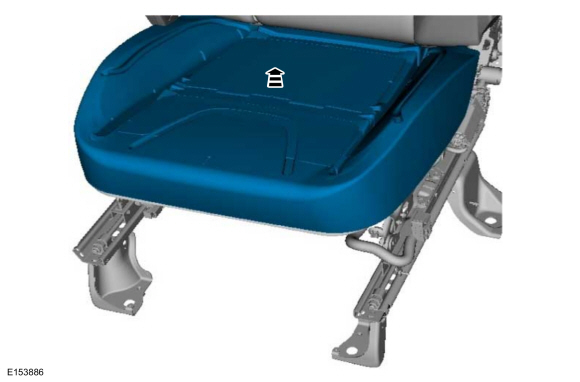 |
-
NOTE: Original equipment (OE) OCS shown, service kit similar.
Remove the pin-type retainers.
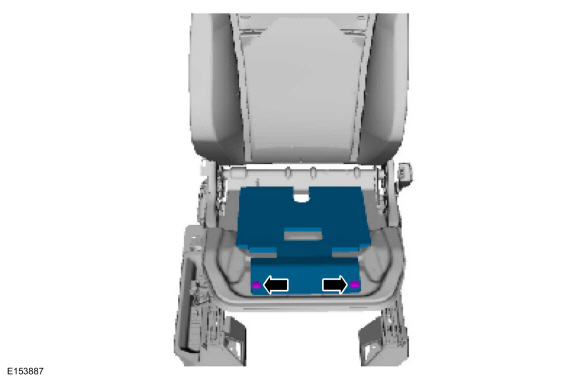 |
-
NOTE: Note the location of the OCS hose and heater mat pigtail (if equipped) as it passes through the seat springs for proper installation.
Route out the OCS hose, sensor and heater mat pigtail (if equipped) from between the seat cushion support wires.
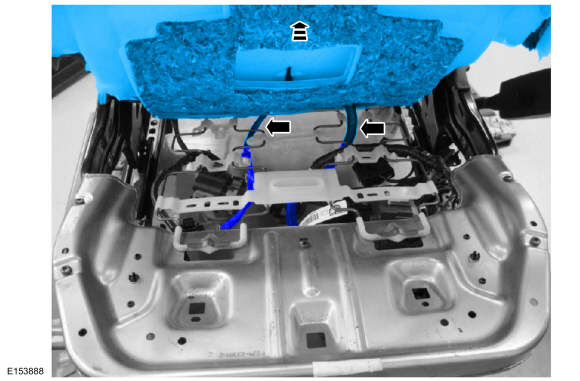 |
Installation
-
NOTICE: Inspect the OCS bladder, seat cushion pan and support assembly for any foreign objects before installing the OCS to the seat cushion pan. Remove any foreign objects. Failure to follow these instructions may result in incorrect operation of the OCS and may cause system failure.
To install, reverse the removal procedure.
Bend the OCS sensor bracket tab back.
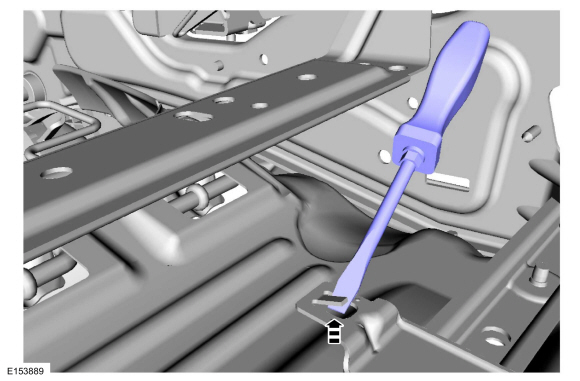 |
-
Install the passenger seat cushion cover. Do not prove out the SRS at this time.
Refer to: Front Seat Cushion Cover (501-10A Front Seats, Removal and Installation).
-
 WARNING:
Occupant Classification System (OCS) parts are
calibrated as an assembly and must only be replaced in the configuration
they are sold. Never separate parts of an assembly. Failure to follow
this instruction may result in incorrect operation of the OCS and
increases the risk of serious personal injury or death in a crash.
WARNING:
Occupant Classification System (OCS) parts are
calibrated as an assembly and must only be replaced in the configuration
they are sold. Never separate parts of an assembly. Failure to follow
this instruction may result in incorrect operation of the OCS and
increases the risk of serious personal injury or death in a crash.
 WARNING:
Make sure the front passenger seat repair is
complete, the seat and all attached components (head restraint, seat
side shield, etc.) are correctly assembled, and the seat is correctly
installed to the vehicle before using System Reset to rezero the seat
weight. Failure to follow these instructions may result in incorrect
operation of the occupant classification system (OCS) and increases the
risk of serious personal injury or death in a crash.
WARNING:
Make sure the front passenger seat repair is
complete, the seat and all attached components (head restraint, seat
side shield, etc.) are correctly assembled, and the seat is correctly
installed to the vehicle before using System Reset to rezero the seat
weight. Failure to follow these instructions may result in incorrect
operation of the occupant classification system (OCS) and increases the
risk of serious personal injury or death in a crash.
NOTICE: To prevent system failure, take the following precautions before carrying out the OCS reset.
- Make sure the voltage to the OCSM is greater than 8 volts and less than 18 volts.
- Make sure the OCS is not below 42.8 °F ( 6 °C) or above 96.7 °F ( 36 °C) when initiating the OCS reset process. If the vehicle has been exposed to extreme cold or hot temperatures, the vehicle must be exposed and kept at a temperature between 42.8 °F ( 6 °C) to 96.7 °F ( 36 °C) for a minimum of 30 minutes.
- Make sure nothing is present on the passenger seat before and during the OCS reset process.
- Prior to carrying out the OCS reset, make sure a minimum of 8 seconds has elapsed after cycling the ignition switch on.
-
If the first system reset attempt was successful, proceed to prove out the SRS.
-
If the first system reset attempt was not successful, carry out a thorough visual inspection of the OCS
connector and wiring for damage, pressure sensor hose for kinks and or
damage, and seat-related wiring harness and body wiring harness
terminals and connectors for damage. Repair any concerns found and
proceed to the next step.
-
Carry out a second OCS reset. Cycle the ignition switch after the OCS reset. If the second attempt is unsuccessful, install a new OCS service kit.
Refer to: Occupant Classification System (OCS) Sensor (501-20B Supplemental Restraint System, Removal and Installation).
-
Prove out the SRS
by turning the ignition from ON to OFF. Wait 10 seconds, then turn the
ignition back to ON and monitor the airbag warning indicator with the
airbags installed. The airbag warning indicator illuminates continuously
for approximately 6 seconds and then turns off. If a SRS fault is present, the airbag warning indicator will fail to light, remain lit continuously, or flash.
-
The flashing might not occur until approximately 30
seconds after the ignition has been turned from OFF to ON. This is the
time required for the RCM to complete the testing of the SRS. If the airbag warning indicator is inoperative and a SRS
fault exists, a chime sounds in a pattern of 5 sets of 5 beeps. If this
occurs, diagnose and repair the airbag warning indicator and any SRS faults.
-
Clear all continuous Diagnostic Trouble Codes (DTCs) from the RCM and OCSM using a diagnostic scan tool.
 Front Impact Severity Sensor. Removal and Installation
Front Impact Severity Sensor. Removal and Installation
Removal
NOTE:
Removal steps in this procedure may contain installation details.
WARNING:
Turn the ignition OFF and wait one minute to deplete
the backup power supply...
 Passenger Airbag. Removal and Installation
Passenger Airbag. Removal and Installation
Removal
WARNING:
Turn the ignition OFF and wait one minute to deplete
the backup power supply. Ignition must remain OFF until repair is
complete...
Other information:
Ford Fusion 2013–2020 Owners Manual: Global Opening and Closing
You can use the remote control to operate the windows with the ignition off. Note: You can enable or disable this feature in the information display or see an authorized dealer. Note: To operate this feature, accessory delay must not be active. Opening the Windows You can only open the windows for a short time after you unlock your vehicle with the remote control...
News: Ford Fusion Recall and Safety Updates
Date: October 19, 2025 The Ford Fusion has recently appeared in several safety and regulatory reports from Ford Motor Company and the U.S. National Highway Traffic Safety Administration, even though production of the model has ended. The agency has officially closed a seven-year investigation into power-steering failures that affected around 263,000 Fusion vehicles from the 2010 model year...
Categories
- Manuals Home
- 2nd Generation Ford Fusion Owners Manual
- 2nd Generation Ford Fusion Service Manual
- Load Carrying
- Electrical
- Body Control Module (BCM). Removal and Installation
- New on site
- Most important about car
Fuel Quality
Choosing the Right Fuel
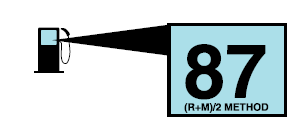
Your vehicle is designed to operate on regular unleaded gasoline with a minimum pump (R+M)/2 octane rating of 87.
